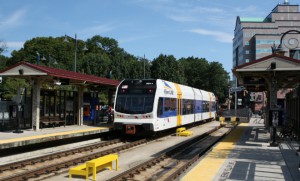New Jersey Future Blog
Investing in Transit Is an Economic Incentive
May 14th, 2014 by Elaine Clisham
Two articles caught our attention recently, both of them about the importance of good transit to economic vitality.
In the first, chief executive officers of publicly-owned companies in the Tampa Bay area were asked what could or should be done to make the area more friendly to businesses. Their answer? Overwhelmingly, they wanted better transportation options for their workers, and specifically cited transit options as an important part of the mix. From the article:
“ ‘It’s hard to get around Pinellas and Hillsborough if you don’t have a car,” said Mark Mondello, CEO of Jabil Circuit. ‘Compared to Chicago, Dallas, L.A., Boston … it’s night and day. If we’re going to attract progressive types of workers and progressive types of corporate businesses, mass transit is an issue.’ “
In the second article, the city of Columbus, Ohio, was notified recently that it did not make the cut as a finalist city for the 2016 Republican National Convention, apparently in part because of a lack of transit options for conventioneers. According to the president of the Columbus City Council, “One of the missing pieces (in bidding for a large convention) was the ability to get around our city easily.”
These stories highlight the importance of investing in transportation infrastructure as an engine of economic growth – not just for the jobs such investment creates, but for the jobs it attracts. At the New Jersey Future Redevelopment Forum in March, former NYCEDC Chief Executive Officer Seth Pinsky made a similar point: Investing in assets such as infrastructure – and he cited in particular the extension of the No. 7 subway line to Manhattan’s West Side – is one critical element to creating magnetic places for developers and corporations to invest.
New Jersey could take a lesson here. Where NJ Transit has been able to expand – the Hudson-Bergen Light Rail, for example – private investment interest has followed. One way that New Jersey pays for transit expansion and its subsequent maintenance is through the state’s Transportation Trust Fund, which is in danger of running dry. It may be time for New Jersey to re-balance its economic development approach and rely less on corporate incentives and more on more permanent infrastructure investments that drive demand. This means getting serious about identifying revenue to fund the Transportation Trust Fund. As Seth Pinsky observed in his Redevelopment Forum remarks, corporate incentives should certainly be on the menu, but perhaps shouldn’t always be the main course. And the evidence is growing, both in New Jersey and in places like Tampa Bay and Columbus, that transit investments are investments in economic growth, and lack of investment can put a damper on it.

















